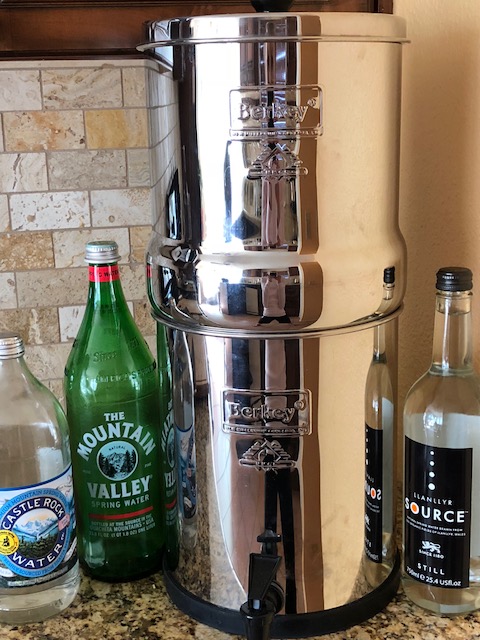It’s kind of a no brainer that we need to drink water, right? After all, our bodies depend on it to function properly. But what if your water is not as clean as you think? That just might be the case if you are drinking unfiltered tap water. In fact, a 2017 analysis of water samples from all across the United States revealed over 267 different types of toxins in our tap water! Turns out that tall drink of water may actually be a tall drink of toxins!!
Recently, I read an article on the front page of the local paper stating that a half dozen wells in the town of Marana have been polluted with toxic chemicals. Marana is a small town not far from where I live so I was a little freaked out when I read this. What was even more disturbing is the Marana Water Department has known since 2016 that the wells were contaminated! You never want to think that this is happening in your own backyard, but the reality is water contamination is becoming pervasive and we need to be aware so that we can protect ourselves.
How are these chemicals getting into our water in the first place? The short answer is our water supply has become increasingly toxic due to an infrastructure of aging pipes and chemical pollution from wastewater treatment plants. The water treatment facilities simply cannot effectively filter out the abundance of toxins showing up in our water supply. Some of the chemicals that are typically found include lead, chlorine, fluoride, and arsenic. 1,4-dioxane which is a synthetic compound and polyfluoroalkyl (PFAS) which is a man made compound were found in the Marana wells. All of these chemicals can cause a wide range of health problems. Dioxane and PFAS, which I talked about in my article on toxic cookware, are known carcinogens.
I know some of you may be thinking, “I drink bottled water so I don’t have to worry.” Honestly, bottled water is not much better. Not only is it expensive but, if you are drinking from a plastic bottle, you are being exposed to all sorts of synthetic chemicals like BPA’s. In fact, the Natural Resources Defense Council (NRDC) studied more that 1000 bottles of different brands of bottled water and found that one third failed microbe impurity guidelines. This means they contained bacteria and other synthetic chemicals. Not to gross you out, but some of the bacteria detected was from fecal matter….okay, that’s just gross!! Some sources, including the NRDC, believe that bottled water is simply tap water labeled as bottled water. To make matters worse, did you know that bottled water manufacturers are not required to disclose the level of contaminants in their water? Ugh! One final note on bottled water. If the label says it came from a municipal source, public water source (PWS) or community water system, you are probably drinking good old tap water….with poop in it! Sorry 🙂
So, we know that tap water is bad and bottled water is not much better, now what? Some type of water filtration system is going to be your best bet. You can go minimalist with a pitcher for drinking water or you can go all out with a whole house filtration system. I took baby steps when I started to filter my water. I have never really liked the tap water in my house because it always looked cloudy and had a weird taste (not a good sign!). Instead, I filled glass water jugs with reverse osmosis water from a dispenser at Whole Foods. After a while, I got really tired of lugging water jugs back and forth so I invested in a Big Berkey counter top water filter (http://bigberkeywaterfilters.com). It filters 2 gallons of water at a time and uses carbon filters. It also has filters that remove fluoride and arsenic. I have been really happy with it. I also installed a shower head filter to remove any chlorine. This is important because if you think about it, while you are enjoying your shower, your skin is absorbing all of those chemicals in the water. 🙁
Last year, I finally decided to go all out and had a whole house filtration system installed. I used a local company called WaterTec. This system uses carbon filters and the unit is about the size of a water softener. It is located in my garage and takes up very little space. I thought it would be more expensive but it definitely did not break the bank. I think it was a little over $1000.
When deciding on what you want to do, it might be helpful to know what toxins are in your water. The EPA regulates tap water in the U.S. and you can obtain a local drinking quality report from them. You can also check out the Tap Water Database from the Environmental Working Group (http://www.ewg.org/tap-water.com). When you enter in your zip code, you can see the latest information on the contaminants in your water. I also called my local water company and they sent me the latest testing report. Once you know what contaminants are in your water you will know what type of filter will work the best. Always look for a filter that has been NSF certified. The National Sanitation Foundation is an independent testing laboratory that certifies water filters.
The most common types of filters are:
- Reverse Osmosis – RO can remove chlorine, inorganic and organic compounds and about 80% of the fluoride.
- Carbon Filters – carbon filters can remove asbestos, chlorine, lead, mercury and other organic compounds. They do not remove fluoride or arsenic.
- Ion Exchange – this is designed to remove heavy metals and minerals such as calcium from your water. It does not remove chlorine.
Obviously, everyone has an opinion on what type of filter works best. It can get confusing for sure. Read reviews, ask friends what they have, consider your budget and then just go for it! Whatever you decide will be the right choice for you. And, if you have to grab a bottle of water while you are out and about, there is some good news. I have seen 3 companies (pictured below) who are selling spring water in glass bottles! Woohoo!! I was at a conference a couple years ago and Castle Rock Water was there. The company had just started selling their bottled water and I was pretty impressed with the source and the quality.
As always, I would love to hear from you. Do you have a favorite water filter? Hit reply and let’s chat!



